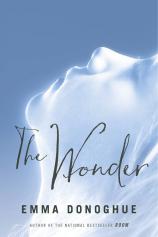The Wonder
Review
The Wonder
Turning the first page of this book was easy. After reading Emma Donoghue’s well-known ROOM, I knew that I would be taken into a story by an author with impeccable writing chops and a proclivity for unusual storytelling.
I wasn’t wrong.
The story immediately dropped me off in 1850s Ireland (without a tedious history lesson, thank you very much), seen through the eyes of pragmatic nurse Elizabeth “Lib” Wright. Trained by Florence Nightingale herself, we learn that Lib’s services have been acquired by Dr. McBrearty to provide some respectability and accountability for somewhat of a local experiment: proving that Anna O’Donnell, age 11, is telling the truth about fasting for over four months.
In this context, the book provides a brilliant juxtaposition between Lib’s scientific, medical skepticism and the cast of locals desperate to believe the “miracle.” Complicating everything is the surrounding culture of unwavering belief in superstitions, mixed with a healthy dose of religiosity that Lib runs into at every turn.
"While Donoghue’s latest tale begins as a fairly straightforward story, fans will be relieved to know that it doesn’t end that way. All the fragments scattered throughout the pages come together in a well-earned, satisfying and, dare I say, thrilling ending to THE WONDER."
As the compliant Anna and Lib get to know each other, Lib’s tasks become less motivated by duty and are more driven by care for her young charge, which is an important grounding for the book. However, as days wear on and shift after shift is described, the author doles out new information sparingly and I found the reading experience a bit wearing. I mean, Lib’s diligence to observing Anna was admirable, but not always the most scintillating reason to turn the page.
What I did really enjoy was the way that Florence Nightingale became a character in the book, reflected in her obvious influence in Lib’s training and life-at-large. Learning more about her was a fascinating look into an incredible woman to whom the whole world owes a great debt for challenging the good-intentioned but often erroneous medical conventions of the day.
The book rebounds as a new character, journalist and lapsed-but-restored believer William Byrne, arrives on the scene. A worthy sparring partner and sounding board for a confused and troubled Lib, his energy is enough to lift the story forward and provide a much-needed turning point in the plot.
Donoghue’s prose throughout is a force to be reckoned with, but I found the portrayals along the spectrum of faith particularly compelling. While most of the well-meaning townfolks’ blind faith leads Anna to the brink of death and Lib’s faith in science alone causes friction amongst their ranks, Byrne’s hard-earned weighted faith provided completion to a delicate balance of viewpoints in the story.
Notably, especially this pivotal conversation about a well-worn subject of faith between Lib and Byrne, which raised the question of how God could exist and allow suffering in the world.
“‘The war, then?’
‘At Scurtari,’ Lib said, ‘I found myself thinking, If the Creator can’t prevent such abominations, what good is he?’
‘Finer minds than yours have reached the same impasse. It’s a great puzzle.’”
Charmingly, in the safety of this “say anything” friendship that brings out the best in them both, Lib becomes more relatable and Byrne less jaded. I found this budding relationship the highlight of the book and wish more time had been spent filling this storyline out.
While Donoghue’s latest tale begins as a fairly straightforward story, fans will be relieved to know that it doesn’t end that way. All the fragments scattered throughout the pages come together in a well-earned, satisfying and, dare I say, thrilling ending to THE WONDER.
Reviewed by Amy Haddock on September 23, 2016
The Wonder
- Publication Date: September 5, 2017
- Genres: Fiction, Historical Fiction, Historical Thriller, Psychological Suspense, Psychological Thriller, Suspense, Thriller
- Paperback: 320 pages
- Publisher: Back Bay Books
- ISBN-10: 031639386X
- ISBN-13: 9780316393867





